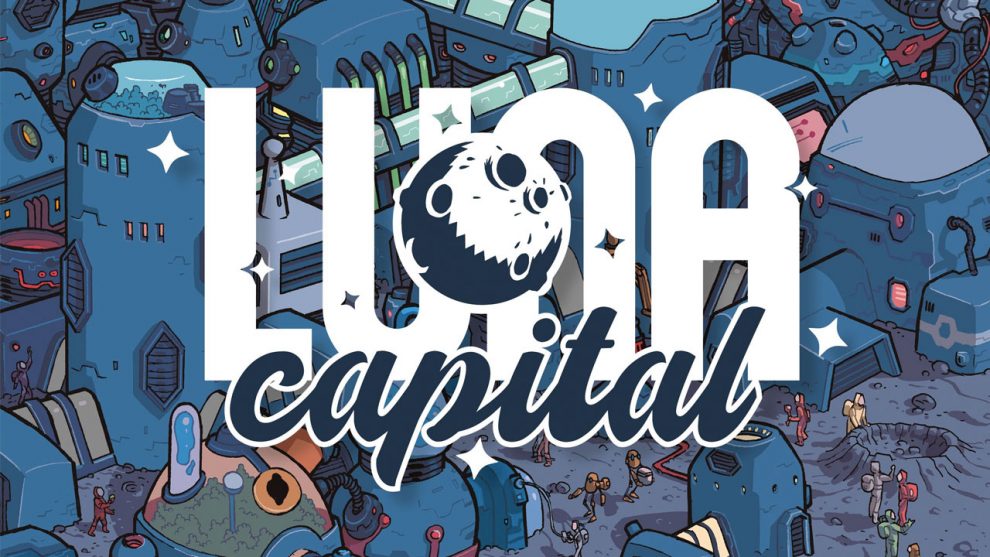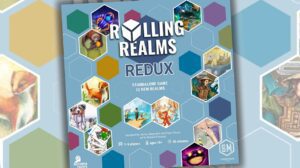Disclosure: Meeple Mountain received a free copy of this product in exchange for an honest, unbiased review. This review is not intended to be an endorsement.
If you give me the chance to lay tiles and build a tableau, I’m probably going to play your game.
Glen More II: Chronicles is, for me, an all-time classic. The mix of laying tiles to build a small, powerful engine of resource generation while using a rondel movement system to grab new tiles always works and I love how much crunch you can get out of an hour-long game.
Kingdomino always works, although lately I’ve been even more enamored with Kingdomino Origins. Placing tiles to trigger scoring combinations—and now adding volcanoes!!—in an accessible, compact experience is a winner for my family and casual gamer friends every time.
LUNA Capital is a card- and tile-laying game designed by Jose Ramón Palacios and published by Devir Games (The Red Cathedral, Paris: La Cité de la Lumière, Bitoku). It’s got an interesting production with some highs and a few lows.
The premise is interesting, even if LUNA Capital would never be labeled thematic. The turns are quick and the goalposts are clear: over the course of 3 phases and 12 total turns, score the most points by building out a “Settlement” (your tableau) with a combination of placing cards in front of you and tiles on top of those cards.
On paper, this felt like it would make for an interesting concept. But the iconography of LUNA Capital is an issue and the lack of a player aid is a missed opportunity.
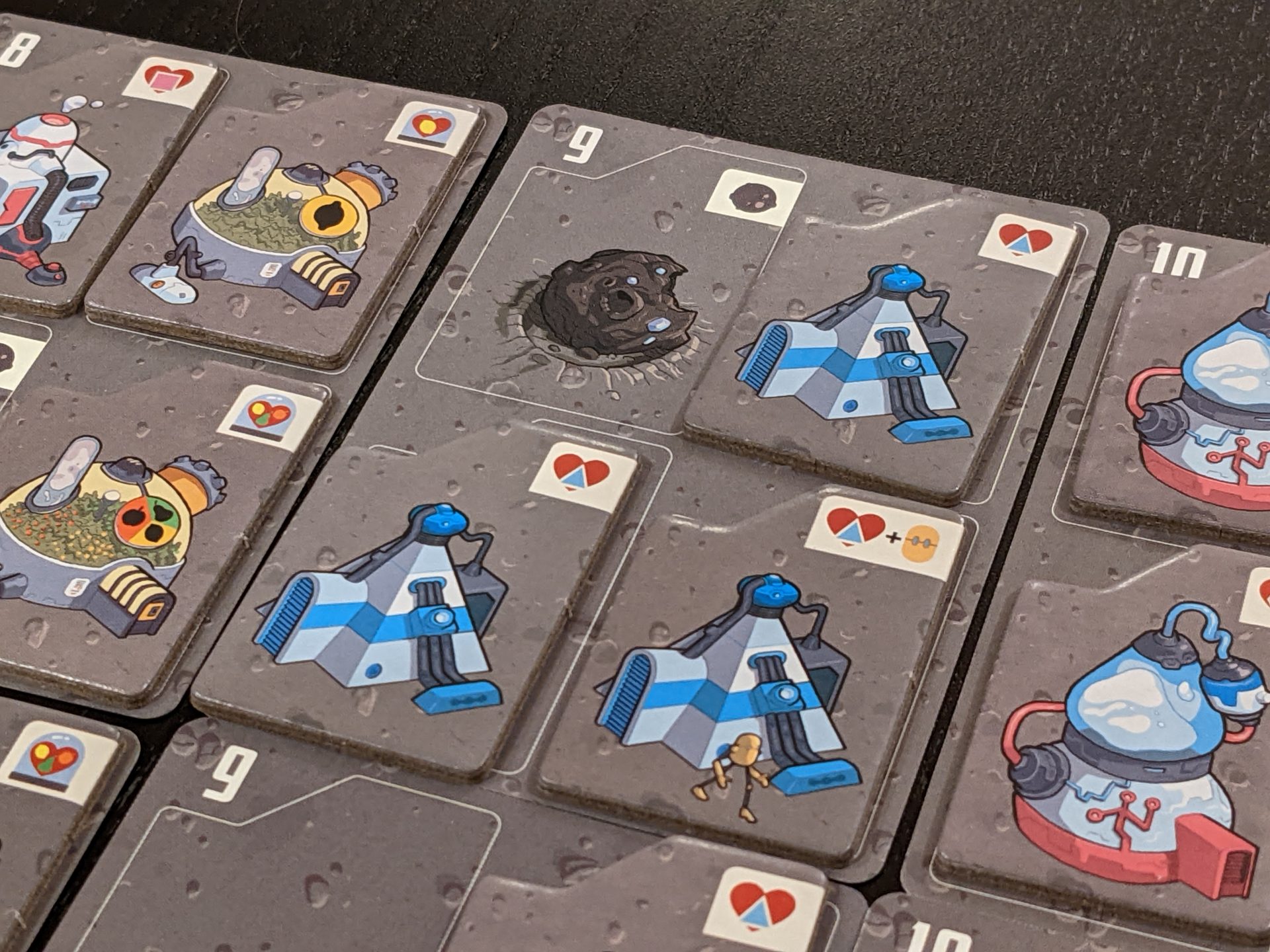
Draft, Place, Talk Amongst Yourselves
I love games that are easy to teach. In this regard, LUNA Capital is easy to get to the table.
LUNA Capital is set in an alternate universe. Imagine it is the 1970s as players represent teams trying to set up colonies on the moon. In each of the game’s 12 rounds, you will draft a Construction Card from a shared market along with any tiles placed below it, then build out these cards and tiles into your Settlement.
The tiles represent different systems that might appear on a moon: construction buildings, vital systems such as water condensers, greenhouses, recycling units. Meteorites also populate some tiles and Construction Cards, along with “Lunar Scaffolding”, which allows for buildings to be built over them on future turns.
None of that really matters, of course; players just need to know which symbols need to be built adjacent to other symbols for set collection scoring. Some buildings and items, like sales offices and meteorites, score in simple ways: for example, majority rules, or just straight points for each office. Other tiles score based on orthogonal adjacency. Still others score milestone bonuses, represented by a selection of 3 public “Concession” cards dealt at the beginning of the game and shared by all players.
LUNA Capital has plenty of ways to score and turns are quick: draft your card and your tile then put your head down and go to work trying to solve the puzzle. Even with players doing all kinds of different things, scores will typically land in the range of 80-100 points, more with experienced players at the table. You will always have something productive to do and you’ll never be completely out of the running.
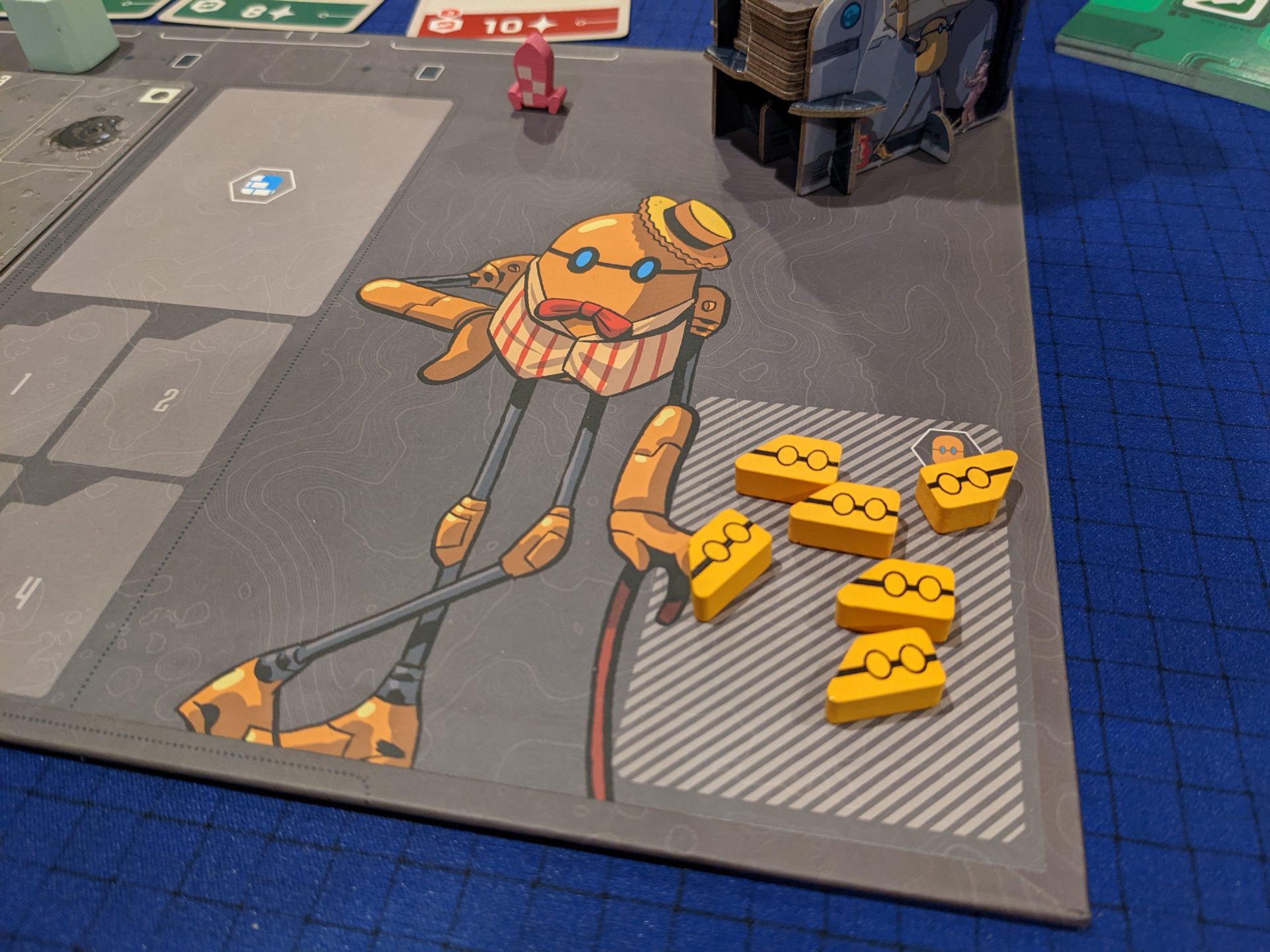
The Iconography: Just, Why?
LUNA Capital is not a difficult experience to decipher. But the game does itself a disservice with the design of the 165 small Project Tiles included in the game.
Each tile is supposed to be able to quickly provide information on which scoring category it belongs to. Meteorites are simple, but the majority of the other tile types are not so simple. This is most evident with the Vital Systems tiles: the Water Condensers, the Oxygen Collectors and the Hydrogen Collectors. The majority of the tile is covered with a picture of each of these buildings, with a small icon in the upper righthand corner.
I was surprised how often I wasn’t able to figure out which one was water, oxygen or hydrogen at a quick glance. Doubling down on this, water is not a picture of, say, a blue drop of water. No, the Water Condenser symbol is a black hexagon on top of a heart. (All the Vital Systems tiles have a heart covered by something else.)
This is not a big deal on its own, since LUNA Capital is really not a game about colonizing a moon. (If you are looking for a heavier thematic experience about colonizing a planet, just buy On Mars and thank me later.) But when you are staring at the market of available cards and tiles, and you want to quickly find the symbols that feature a heart with either a blue triangle, black hexagon or pink square, that is difficult.
Add in the fact that Greenhouses are another vital system but a little harder to pick out because there’s a blue bubble around the hearts on these tiles, with one of 3 fruits being grown inside your Greenhouse. And then, these systems score in a different way than the other Vital Systems do. But they also score in the way that the Collectors and Condensers do.
Wait, what?
That’s right. Scoring in LUNA Capital, for a game that is really straightforward, is a bit dense. Your Vital Systems, Greenhouses, and Construction Projects all score a little differently.
All of this could be mitigated with a single item not included in the box: a solid, double-sided player aid that reminds players of what each symbol means along with the end-game scoring conditions. I literally gave other players during my first 4-player game blank score sheets to use as a guide. (Devir has added a player aid to BGG and its website to address this complaint.)
At the end of each phase (rounds 4, 8 and 12), any Concessions (those milestone cards) that were met by any player are marked and pushed aside for scoring at the end of the game. In future rounds, only Concessions that have not been scored by any single player are available.
Those Concessions have proven to be a little controversial in my plays of LUNA Capital. They usually require meeting what look like simple requirements: build 3 adjacent Water Condensers in a row or column across your Settlement. But what if you never see any cards or tiles that have Water Condensers? A bit like the Sponsors action in Ark Nova—what if I never draft or draw any Sponsors cards??—you might find that your inability to complete Concessions in LUNA Capital has nothing to do with your skill level, it just comes down to the luck of the draw.
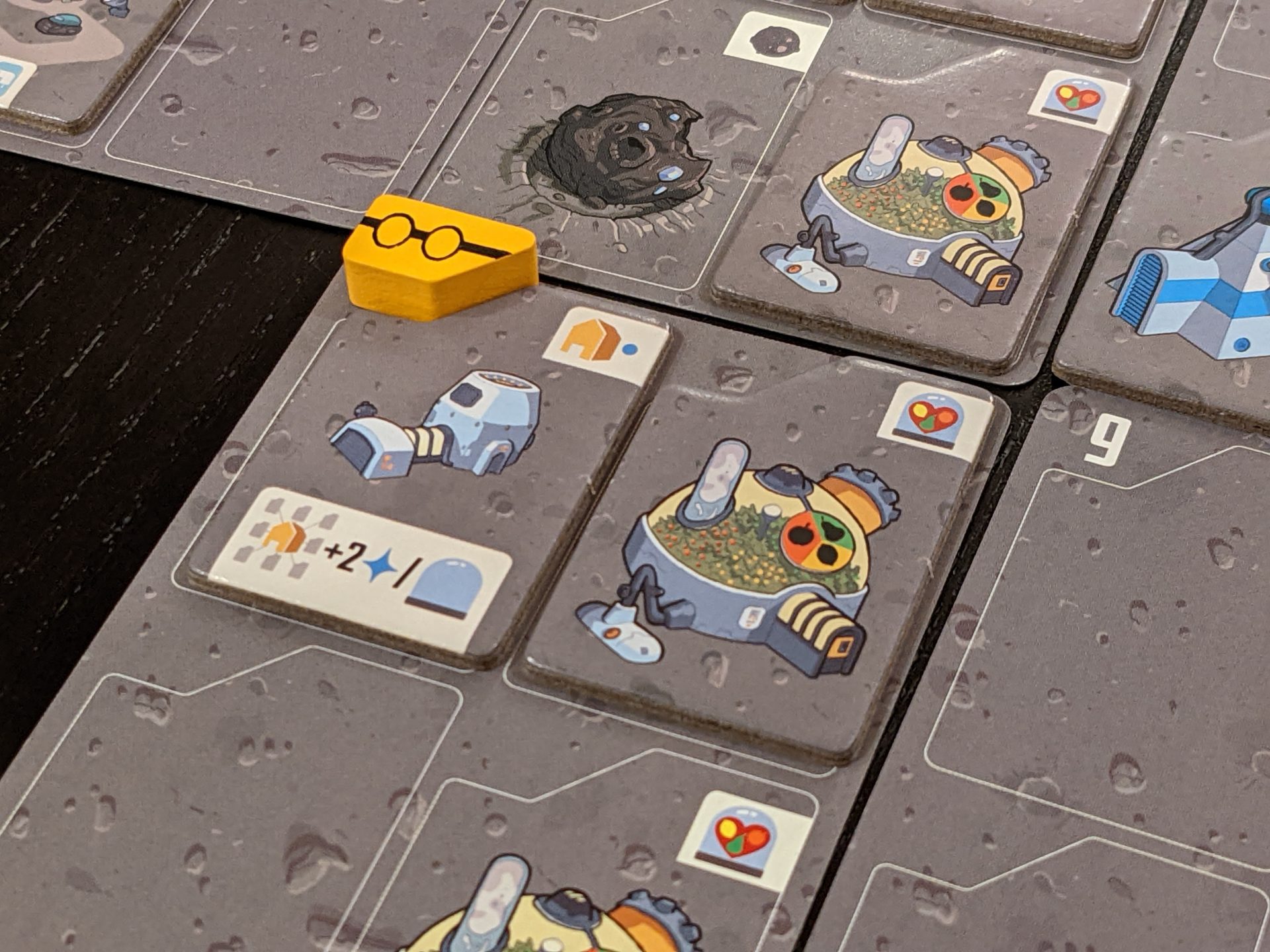
Solo Play
Solo play in LUNA Capital is a great teaching tool and a fun way to learn the ropes. It’s amazingly easy to get rolling: flip the board to its solo side (limiting the market to 3 spaces instead of 4), then draft a card/tile combo and then draft one for the AI, stacking its cards and tiles off to the side for now.
You do that 12 times, resetting the board each turn as if it was a 2-player game. A solo play takes maybe 20 minutes. The scoring for a solo game, though, is a bit of a pain. “Luckily” for you, the AI in LUNA Capital plays exceptionally well unless you stay in front of its ability to draft the cards that will score it the most points. In this way, I’m not sure it’s necessarily a great imitator of a human opponent (at least, one at a lower skill level), but it’s an acceptable way to get LUNA Capital to the table for a couple plays in-between meetings during your work day.
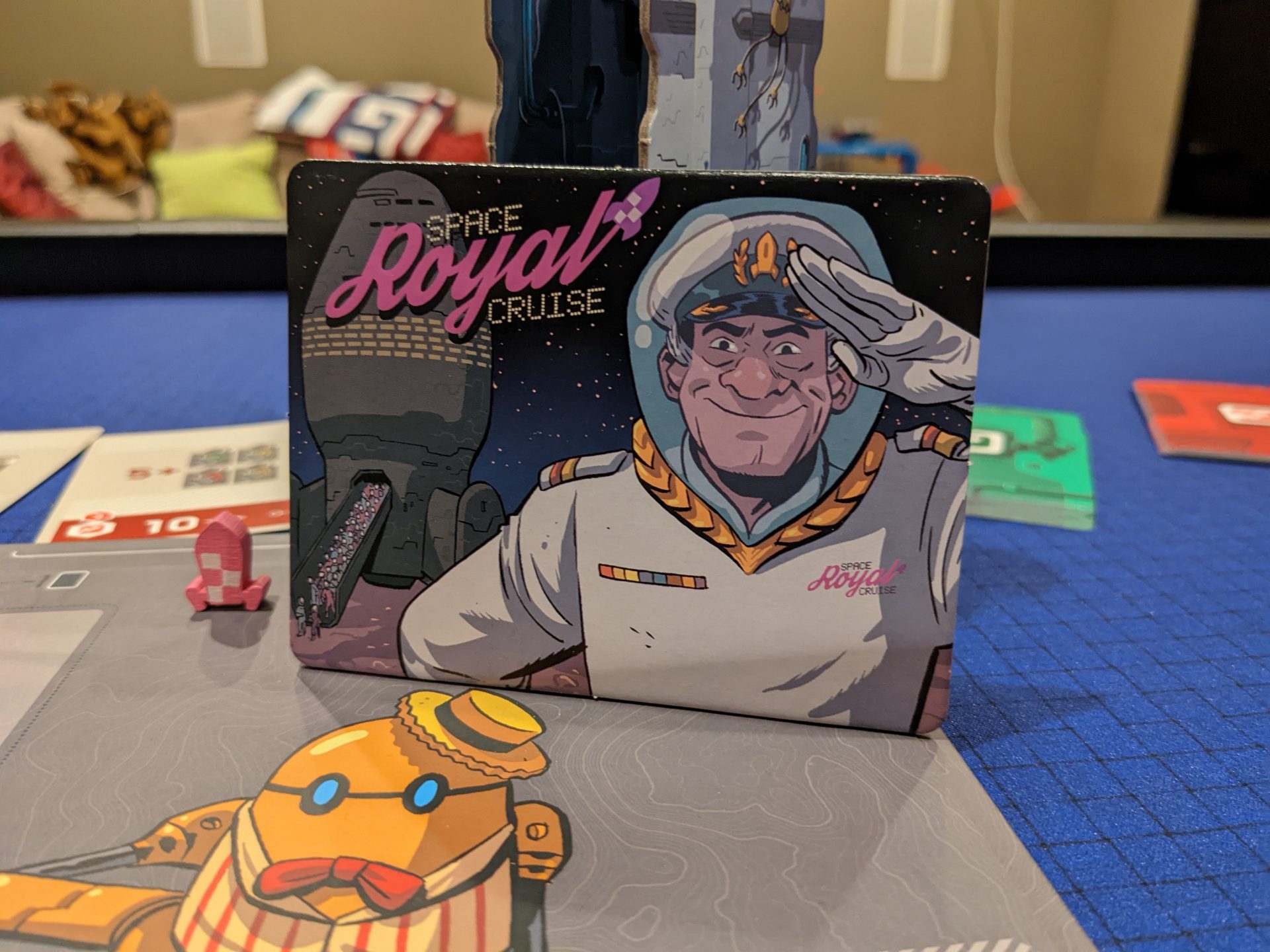
An Average Puzzle That Passes the Time
Although my confidence in Devir is not shaken, I am surprised to share that I don’t adore LUNA Capital, especially based on my experience with their excellent The Red Cathedral.
The benefit of playing lots of similar tile-laying games means I would pick many other recent games over LUNA Capital, some of which were mentioned at the top of this article.
For players new to tile-laying tableau builders, LUNA Capital provides an average to above-average experience. It’s easy to teach and has always left players in at least a place of “not bad”; if this kind of game turns you on, the purchase price is fair for the experience.


